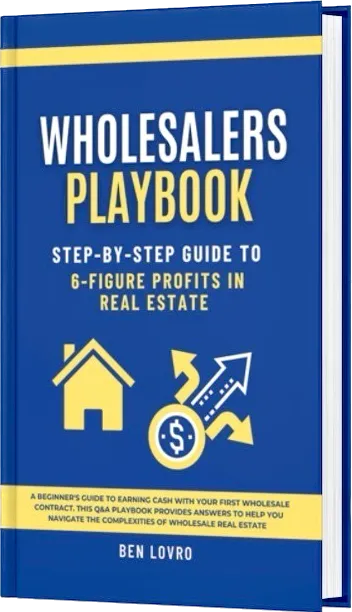Investor Syndicate Blogs
Download The Deal Flipping Playbook

Wholesaling Real Estate With No Money
Introduction
The concept of wholesaling holds a unique allure. It's often perceived as a gateway for aspiring investors to enter the market with limited financial resources. The idea of wholesaling real estate with no money down has garnered attention for its potential to generate profits without substantial capital.

Understanding Wholesaling
Wholesaling, at its core, involves acting as an intermediary between a motivated seller and a cash buyer. The wholesaler negotiates a favorable purchase price with the seller, typically at a significant discount, and then assigns the contract to the buyer for a fee. This fee, known as the assignment fee, becomes the wholesaler's profit.
Understanding "No Money Down"
The "no money down" strategy suggests that investors can purchase real estate properties without making a significant cash down payment. Instead, they rely on creative financing methods, partnerships, or leveraging existing assets to facilitate the transaction. While it is possible to structure deals with minimal upfront cash, it's crucial to acknowledge the challenges and risks associated with such approaches.
The Reality of Real Estate Investment
1. Financing Alternatives
Achieving a "no money down" deal often requires exploring alternative financing options, such as seller financing, private money lenders, or leveraging existing assets like equity in other properties. While these methods can reduce the immediate cash burden, they may involve higher interest rates or complex negotiations.
2. Risk Considerations
Investors must carefully evaluate the risks associated with "no money down" deals. Depending solely on creative financing can lead to financial strain if market conditions change, property values decline, or rental income falls short of expectations.
3. Expertise and Diligence
Successful implementation of "no money down" strategies demands a high level of expertise, negotiation skills, and diligent research. Investors must thoroughly understand the intricacies of the deal, conduct due diligence on the property, and negotiate favorable terms with all parties involved.
The Balanced Approach
While "no money down" deals are feasible in certain situations, they should not be seen as a one-size-fits-all solution. Real estate investment is inherently nuanced, and each deal requires a tailored approach. Aspiring investors should focus on building a strong financial foundation, expanding their knowledge, and leveraging available resources. By adopting a balanced approach that combines creative financing with prudent risk management, investors can navigate the complexities of real estate investment successfully. It's essential to prioritize education, seek mentorship, and develop a comprehensive investment strategy to achieve long-term financial goals in the ever-evolving real estate landscape.
The No Money Down Myth
While the term "no money down" may sound enticing, it's important to clarify that some level of financial commitment is usually required in wholesaling. However, the capital involved is substantially less than what's needed for traditional real estate transactions. Here's a breakdown of the essential steps in wholesaling:
1. Marketing and Lead Generation
Investors need to allocate resources for marketing efforts to identify motivated sellers. This can involve online advertising, direct mail campaigns, or networking within local real estate communities.
2. Contractual Agreements
Wholesalers enter into a purchase agreement with the seller, specifying the terms of the deal. Although no substantial funds are typically exchanged at this stage, a nominal earnest money deposit may be required.
3. Assignment Fee
The assignment fee is the wholesaler's profit and is paid by the buyer upon closing the deal. This amount compensates the wholesaler for their efforts in securing the property.
4. Closing Costs
In some cases, wholesalers may need to cover minimal closing costs or administrative fees. However, these expenses are generally far lower than those associated with a conventional real estate transaction.
Strategies for Success
To thrive in wholesaling real estate with limited funds, investors must adopt a strategic approach. Here are key strategies to consider:
1. Market Research and Analysis
The foundation of a successful land wholesaling venture begins with thorough market research and analysis. Investors must gain a deep understanding of the local real estate market, zoning regulations, land values, and trends. Identifying areas with growing demand for land is key. By staying informed about market dynamics, investors can pinpoint the most lucrative opportunities.
Actionable Tips:
Regularly review real estate publications, attend local property auctions, and monitor online listings to keep abreast of market trends.
Identify areas that are undergoing infrastructural developments or urban expansion, as these often present prime opportunities for land wholesaling.
2. Lead Generation
Generating leads is essential in finding motivated sellers willing to part with their land at favorable terms. Investors should deploy diverse lead generation strategies to build a robust pipeline of potential deals. These strategies may include:
a. Online Marketing: Establish a strong online presence through a professional website and active social media profiles. Utilize digital advertising and search engine optimization (SEO) to attract motivated sellers.
b. Direct Mail Campaigns: Sending targeted mail to landowners in specific areas of interest can yield leads. Engaging and informative mailers can capture the attention of potential sellers.
c. Networking: Building relationships within the real estate community and local chambers of commerce can lead to referrals and connections with motivated sellers.
3. Due Diligence
Effective due diligence is a cornerstone of successful land wholesaling. Investors must thoroughly evaluate potential land deals to mitigate risks and ensure they are acquiring properties with significant resale potential. Due diligence activities may encompass:
a. Site Visits: Physically inspect the land to assess its condition, boundaries, access, and suitability for development or resale.
b. Title Searches: Verify property ownership, identify any encumbrances, and confirm the absence of legal issues that could hinder the resale process.
c. Environmental Assessment: In some cases, it may be prudent to conduct environmental assessments to ensure the land is free from contamination or issues that may affect its marketability.
4. Negotiation Skills
Successful land wholesalers excel in negotiation. They must be adept at securing properties at favorable prices, allowing for profitable resales. Negotiation strategies should focus on win-win outcomes, where both the seller and the wholesaler benefit.
Actionable Tips:
Build rapport with sellers to create a positive negotiation atmosphere.
Understand the seller's motivations and pain points to tailor negotiation approaches effectively.
Be prepared to walk away from deals that do not align with profit goals.
5. Building a Strong Online Presence
In today's digital age, establishing a robust online presence is crucial for attracting motivated sellers. A professional website with detailed information about the wholesaling process and the benefits of working with the investor can instill confidence in potential sellers. Engaging content, such as blog posts about land investment, can position the wholesaler as an industry expert.
6. Effective Marketing and Promotion
Investors should employ effective marketing strategies to reach potential sellers. Digital marketing, including social media advertising and email campaigns, can be highly targeted to reach landowners interested in selling. Additionally, investors can participate in local real estate events, trade shows, and community activities to enhance their visibility and reputation within the industry.
7. Continuous Education and Networking
The real estate market is dynamic, and successful land wholesalers must stay updated with industry trends, regulations, and negotiation techniques. Attending real estate seminars, workshops, and networking events can provide valuable insights and opportunities to connect with fellow professionals.
8. Leveraging Real Estate Professionals
Collaborating with real estate professionals such as agents, appraisers, and attorneys can streamline the wholesaling process. These experts can provide valuable guidance, connect wholesalers with potential sellers, and ensure all transactions adhere to legal requirements.
In conclusion, wholesaling real estate with no money down, while not entirely devoid of financial commitments, offers an accessible entry point into the world of real estate investing. By employing effective strategies, networking, and market research, investors can embark on a rewarding journey in wholesaling, even with limited initial capital. Success in this endeavor hinges on a proactive approach, negotiation prowess, and a deep understanding of the local real estate landscape.
Contact Us

Bet On Yourself
Empowering real estate investors with the tools they need to scale.






